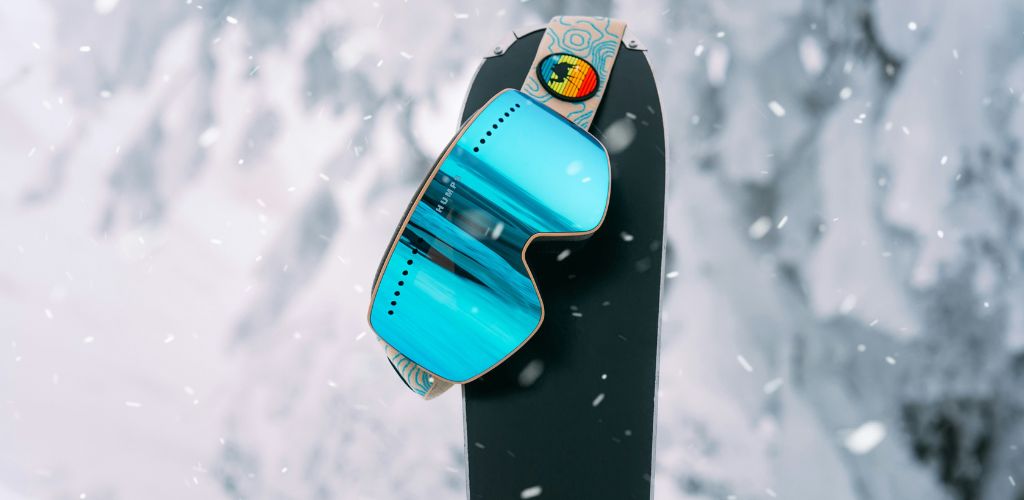Mountain biking, a sport that does require a fair amount of equipment, really does need the right gear for safety and for just having a good time in all honesty.
Among various protective equipment options, eyewear is an important one – whether it’s sunglasses or goggles that you’re wearing.
Fun fact: My opinion on how important eyewear for mountain biking was changed dramatically the day that a thin branch raked across my eye during a downhill mountain biking run, ripping out my contact lens in the process, and somehow, miraculously, leaving my eye uninjured. I started wearing eyewear every ride after that.
So, if you don’t already have your own pair for mountain biking, can ski goggles double as mountain biking goggles?
While the answer is not straightforward, I will delve into the nuances, comparing the two and offering insights based on my experience and the general consensus of mountain bikers who have tried both.

Understanding the Basics
Goggles, be it for skiing or mountain biking, serve the fundamental purpose of protecting your eyes.
They shield against debris, dust, insects, and UV rays.
However, the specific requirements of mountain biking and skiing mean that the goggles designed for each sport have distinct features tailored to meet these unique demands. Shout out to all the dusty and muddy trails I’ve ridden over the years!
Lens Design: Clarity Versus Protection
The most notable difference lies in the lens design.
Ski goggles typically feature double-layered lenses to prevent fogging in cold conditions, a feature that can hamper depth perception in mountain biking scenarios.
On the other hand, MTB goggles usually have single-layered lenses, designed to offer clear visibility in various lighting conditions encountered on trails.

Ventilation: A Matter of Comfort
Mountain biking goggles are designed with more ventilation to accommodate the intense physical exertion and varying temperatures of biking.
This contrasts with ski goggles, which aim to keep cold air out, potentially making them less comfortable for mountain biking, especially in warmer climates.
Helmet Compatibility: Ensuring a Secure Fit
Helmet compatibility is another crucial factor.
While ski goggles are designed to fit with open-face ski helmets, MTB goggles cater to both open-face and full-face biking helmets.
This difference can significantly impact your choice depending on your preferred helmet style for mountain biking.
Durability and Cost: Long-Term Considerations
In mountain biking, goggles face the constant threat of scratches from branches and pebbles.
MTB goggles are built to withstand these elements and are generally more cost-effective compared to ski goggles, which, while durable, may not be as resistant to such trail-specific wear and tear.

The Verdict: Can You Use Ski Goggles for Mountain Biking?
Yes, but with caveats.
Ski goggles can serve as a temporary solution for mountain biking.
They offer basic eye protection but fall short in terms of lens technology, ventilation, helmet compatibility, and durability for mountain biking needs.
For regular mountain bikers, especially those into downhill and enduro, investing in a dedicated pair of MTB goggles is a prudent choice to ensure optimal visibility, comfort, and protection.
Why Invest in MTB Goggles?
- Optimized Visibility: MTB goggles are designed with lenses that cater to the varying light conditions of trails, enhancing clarity and reducing glare.
- Enhanced Comfort and Fit: Specifically designed for mountain biking, these goggles offer a comfortable and secure fit, integrating seamlessly with different helmet types.
- Superior Ventilation: They feature advanced ventilation systems to accommodate the physical exertion of biking, ensuring clear vision and comfort.
- Robust Protection: MTB goggles are built to withstand the rigors of off-road riding, offering durable protection against potential impacts and trail debris.
- Cost-Effectiveness: In the long run, MTB goggles prove to be more economical, given their durability and the lower cost of lens replacement compared to ski goggles.
The bottom line…
While ski goggles might seem like a convenient alternative for mountain biking, they are not designed to meet the specific challenges and conditions of the sport.
For the best experience, safety, and long-term value, opting for goggles specifically designed for mountain biking is the recommended choice. This investment not only enhances your performance but also helps ensure your safety while you’re shredding trail.
See you out there!

